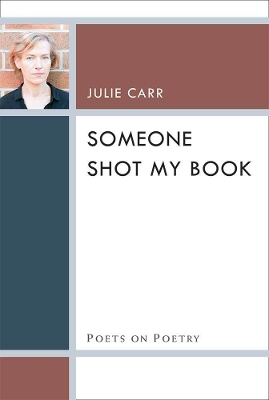Poets on Poetry
1 total work
Approaching the practices of reading and writing from a feminist perspective, Someone Shot My Book asks important ethical questions about the role of poetry—and of art in general—in a violent culture. Julie Carr addresses issues such as motherhood in the academy, gun violence, the art of listening, police violence against black people, reading and protest, the body and the avant-garde, gardening, homelessness, and feminist responses to war in essays that are lucid, inventive, and grounded, always, in a life spent reading and writing poetry. Essays on feminist poets Lorine Niedecker, Jean Valentine, Anne Carson, Lyn Hejinian, and Lisa Robertson detail some of the political, emotional, and spiritual work of these forerunners. A former dancer, Carr also takes up question of text, dance, performance, and race in an essay on the work of choreographer, writer, and visual artist Ralph Lemon and poet Fred Moten.
Carr’s essays push past familiar boundary lines between the personal/confession and the experimental/conceptual strains in American poetry. Pressing philosophical inquiries into the nature of gender, motherhood, fear, the body, and violence up against readings of twentieth-and twenty-first-century poets, she asks us to consider the political and affective work of poetry in a range of contexts. Carr reports on her own practices, examining her concerns for research and narrative against her investment in lyric, as well as her history as a dancer and her work as curator and publisher.
Someone Shot My Book presents the work of poetry as a somatic, affective, and political project that moves far from the page while remaining grounded always in language’s possibilities. It will appeal to poets, feminists, scholars, and anyone interested in the relationships between politics, poetry, and other art forms.
Carr’s essays push past familiar boundary lines between the personal/confession and the experimental/conceptual strains in American poetry. Pressing philosophical inquiries into the nature of gender, motherhood, fear, the body, and violence up against readings of twentieth-and twenty-first-century poets, she asks us to consider the political and affective work of poetry in a range of contexts. Carr reports on her own practices, examining her concerns for research and narrative against her investment in lyric, as well as her history as a dancer and her work as curator and publisher.
Someone Shot My Book presents the work of poetry as a somatic, affective, and political project that moves far from the page while remaining grounded always in language’s possibilities. It will appeal to poets, feminists, scholars, and anyone interested in the relationships between politics, poetry, and other art forms.
